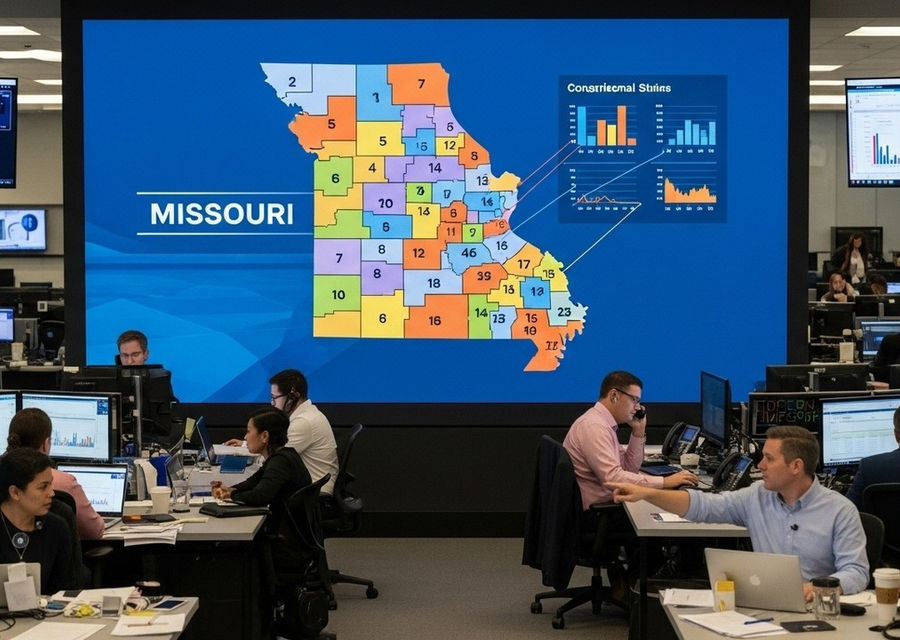Missouri Redistricting Maps: GOP Leverage and Midterm Odds
- THE MAG POST

- Sep 4
- 3 min read

Missouri redistricting maps are moving into a high-stakes phase as lawmakers reconvene to redraw congressional lines amid national pressure for partisan advantage. The unfolding process, triggered by a special session called by Gov. Mike Kehoe, sits at the intersection of state authority and federal political dynamics. With the GOP holding the balance of power in the General Assembly, the way lines are drawn could alter the state's representation in Washington for years to come. National conversations spurred by the Trump administration echo in Missouri as state leaders test boundaries between political strategy and electoral fairness. This commentary expands on what is at stake, who is involved, and what voters should monitor next.
Missouri Redistricting Maps and the GOP's Path to a New Advantage
Missouri redistricting maps are moving into a high-stakes phase as lawmakers reconvene to redraw congressional lines, a move observers say could tilt power in Washington for years.
Timing, Procedure, and Political Context
The special session, convened by Gov. Mike Kehoe, is expected to start at noon and will set the pace for a vote on new maps next week. With a Republican majority in both chambers, leaders have signaled they will pursue lines favorable to their party, arguing the task is a constitutional duty tied to population shifts.
National chatter around redistricting has intensified since a broader push from the Trump orbit began in Texas and expanded into the Midwest. In Missouri, that pressure intersects with state house dynamics and the practical realities of mapmaking, including public testimony, legal considerations, and the risk of court intervention if a plan is challenged as partisan.
Strategic Implications and Risks
Analysts say a favorable redraw could nudge Missouri from its current six of eight seats toward a more lopsided distribution, potentially adding a seventh seat for Republicans if demographics and turnout cooperate. The move would influence committee assignments, funding priorities, and national messaging ahead of the midterms.
Critics warn that aggressive gerrymandering erodes voter influence and invites rounds of litigation, delay, and political backlash. Supporters argue that timely redistricting is essential to reflect population shifts and ensure fair representation, even as who draws the maps remains a political choice.
Is Gerrymandering Redrawing the Midwest and Beyond?
A broader pattern exists in which state legislatures and aligned governors redraw district lines after each census, sometimes following templates seen in neighboring states. Texas, for example, recently enacted a map package that its supporters said would increase Republican representation, a move that has ripples for districts across the region and beyond.
Missouri's case sits at the heart of a national conversation about how districts are carved to reflect population changes while sparking debate about fairness, transparency, and the role of courts in policing partisan manipulation.
Public Input or Courtroom Battles? The Legal Debate Over Redistricting
Two primary paths shape the legal landscape: the legislative process, which can be challenged in state and federal courts, and potential moves to establish independent commissions that reduce partisan control. Each option carries tradeoffs between speed, accountability, and public trust.
Public access to hearings, data, and draft maps underpins the legitimacy of any redistricting plan. Advocates argue that robust transparency can deter opaque practices, while opponents warn that openness alone cannot prevent partisan outcomes.
Key Takeaways
What Voters Should Watch Next
Watch for the timing of committee votes, the emergence of final map drafts, and any signs of court challenges or political concessions. The next moves could recalibrate Missouri's representation and influence on federal policy for years to come.
Long-term Implications for Representation
Regardless of the outcome, the redistricting process will test trust in institutions and highlight ongoing tensions between population realities, political power, and the principle of fair representation that underpins American democracy.
Aspect | Summary |
Topic | Missouri redistricting maps and partisan dynamics |
Timeline | Special session begins at noon; maps debated next week |
Stakeholders | Missouri lawmakers, Gov. Kehoe, GOP leadership, national allies |
National Context | Trump's push; Texas template; regional implications |
Potential Outcomes | Possible shift toward more Republican seats; impact on committees and policy |
Legal & Public Process | Hearings, transparency, risk of court challenges |






















































Comments